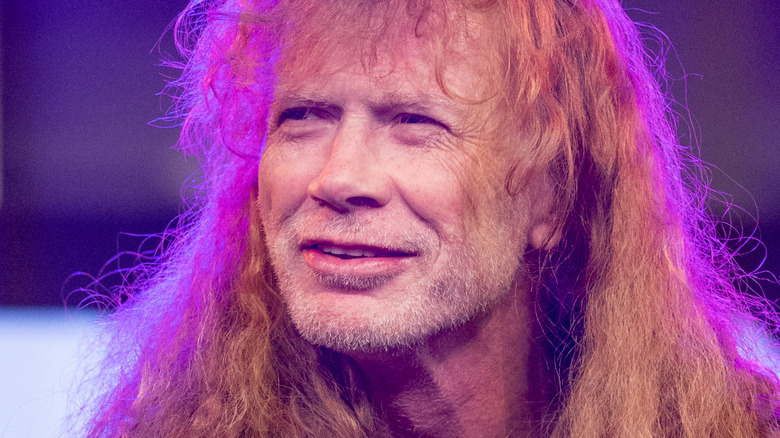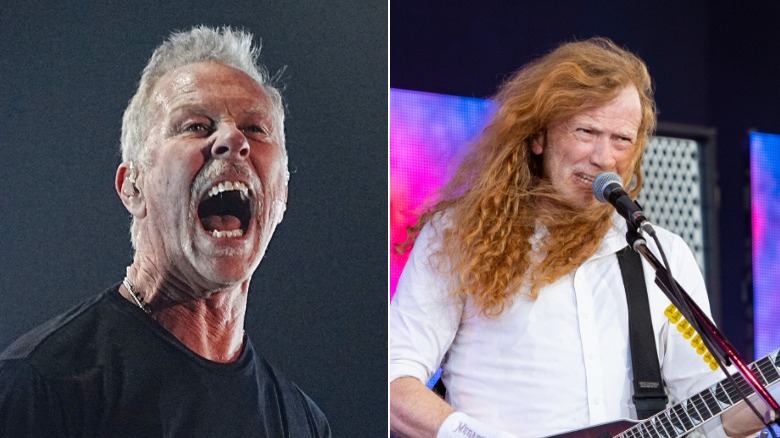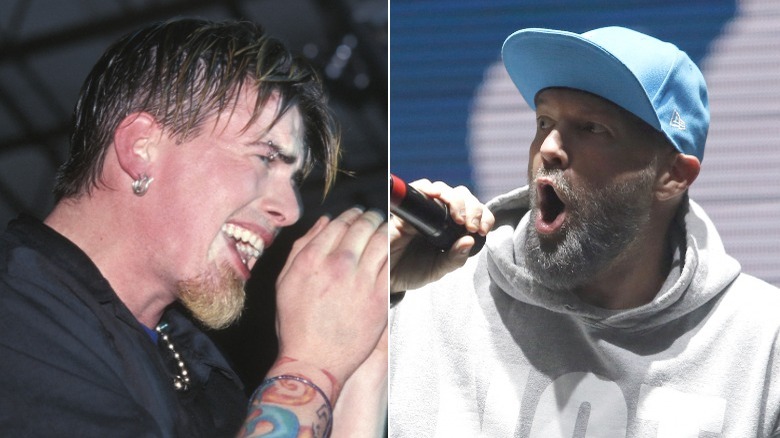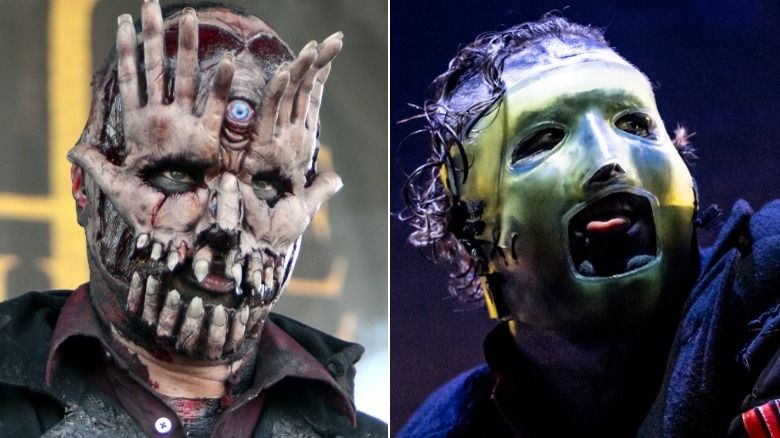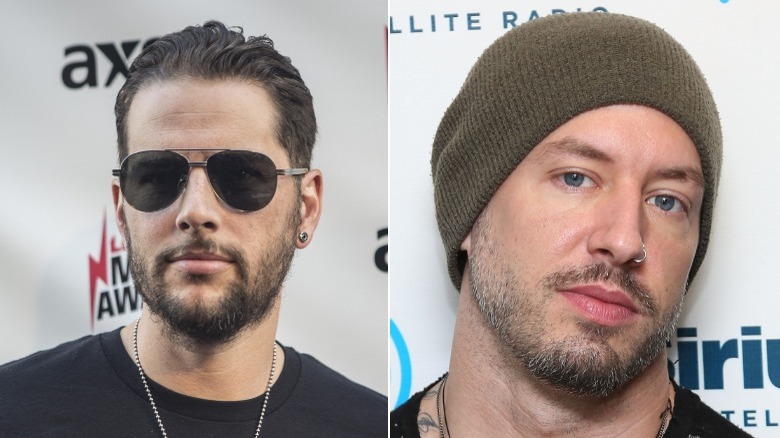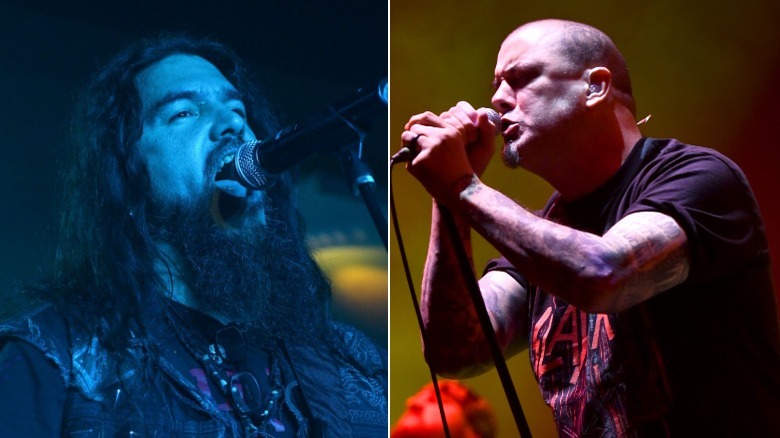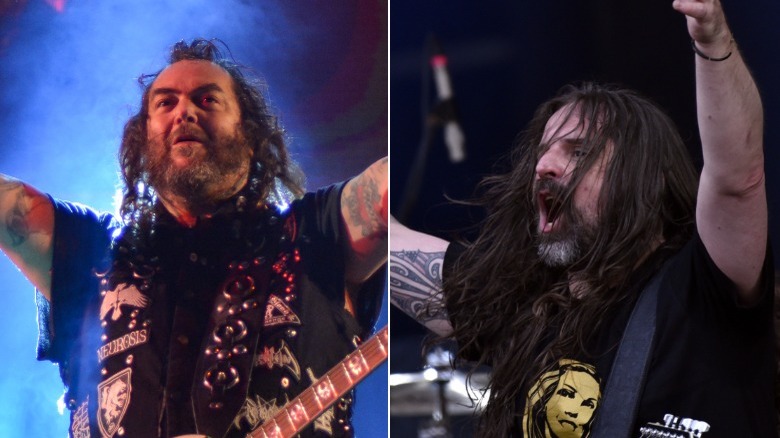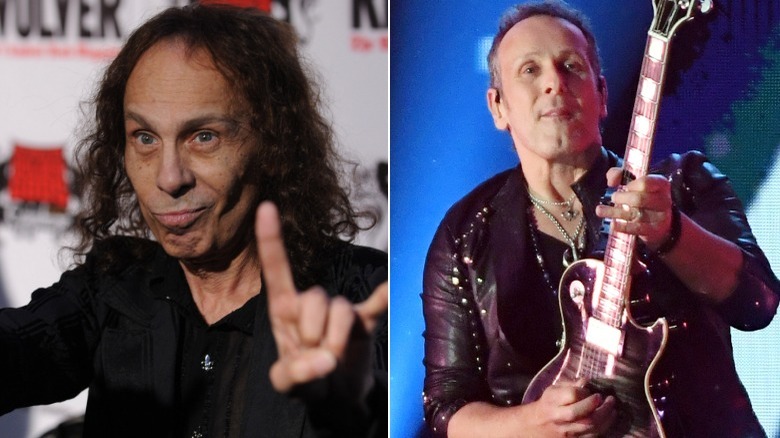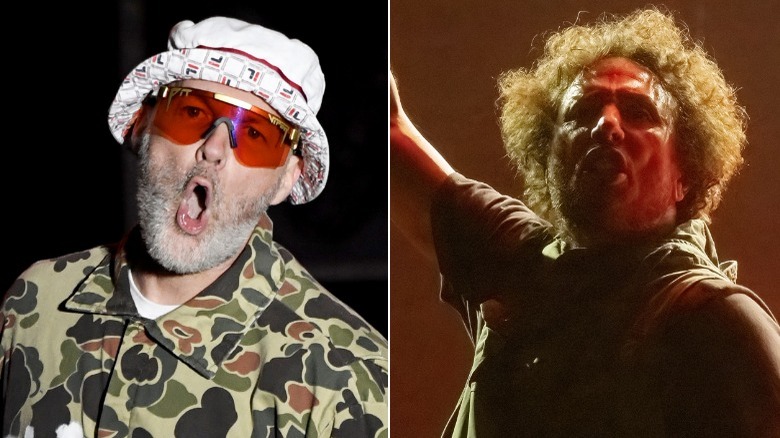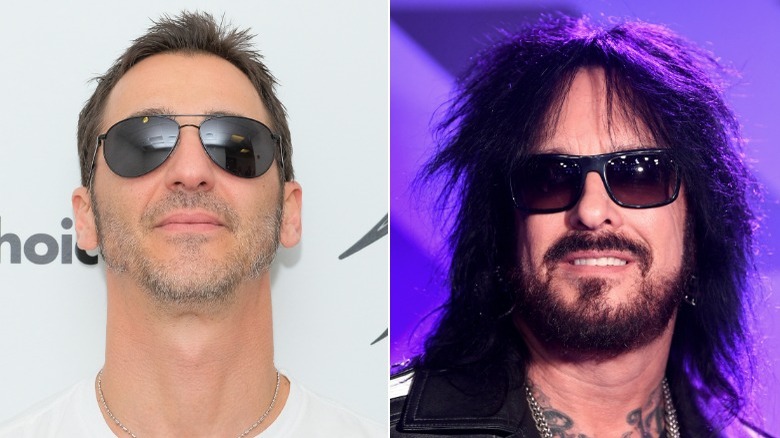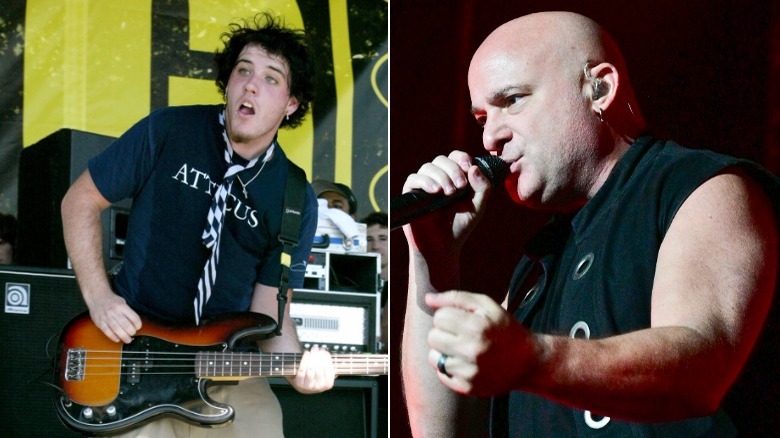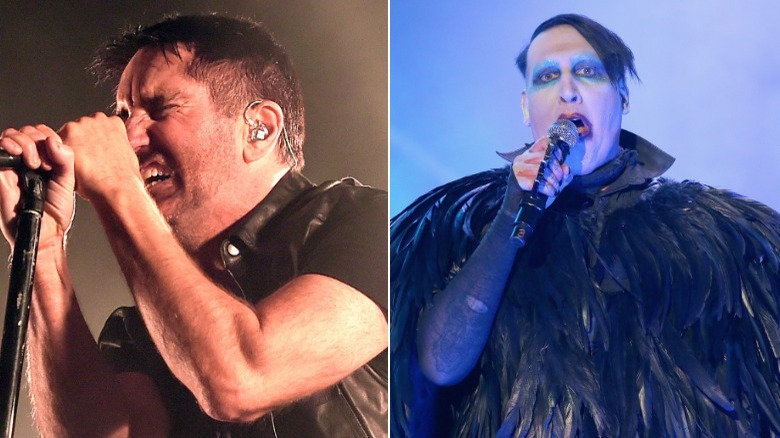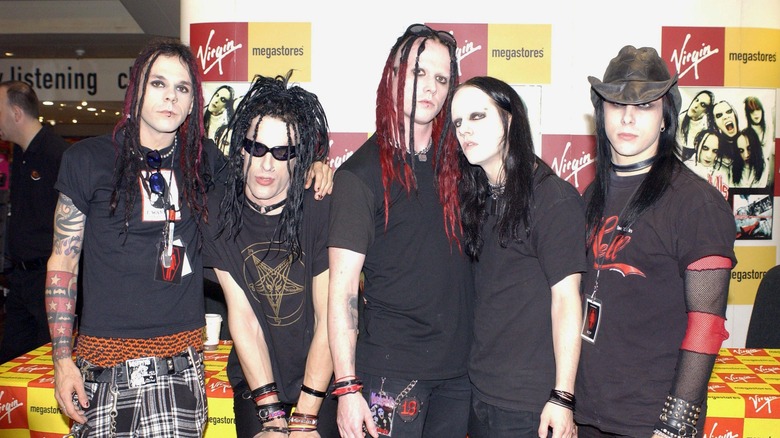The Fiercest Feuds In Heavy Metal
Despite the unbridled aggression and high intensity of heavy metal music, the community is anything but — apart from those noisy elitist trolls who pollute forums and social media comment sections with their nonsense. Most metal fans want to throw their devil horns up in the air, headbang, and have a good time as they rock along to their favorite artists. After all, music is meant to create a sense of belonging and to bring people together, so why not be merry and enjoy it as a group? That said, sometimes it isn't only the metal riffs that are jagged: There are many musicians who simply don't get along and have rough relationships in the industry.
The nature of the beef can vary, from understated to extreme. In some instances, overinflated egos flare up and it becomes a case of seeing who can puff out their chest more to look like the bigger pigeon. However, there are other quarrels that stem from specific points of contention. They can span several years — or decades — and are far more complex and personal than most fans realize. From kicking dogs to leaked voicemails and serious accusations of racism, let's take a look at the fiercest feuds in heavy metal and what sparked these conflicts in the first place.
Metallica vs. Dave Mustaine
The combination of Metallica and Dave Mustaine is the equivalent of pineapple on pizza; people will try it and enjoy the initial burst of flavor, but the romance won't last in the long run. The Metallica and Mustaine feud extends all the way back to the early days when Mustaine, who later founded Megadeth, played guitar for the legendary San Francisco metallers. Tensions flared at a band practice when Mustaine's dogs jumped up on bassist Ron McGovney's car and Metallica frontman James Hetfield proceeded to kick the dogs. In retaliation, Mustaine punched Hetfield and was fired from the band on the spot, though he did return only to be handed a one-way bus ticket and fired again for good in April 1983.
For years afterward, Mustaine and Metallica didn't miss a beat when it came to trading barbs in the press. In an interview with Revolver in 2022, though, Mustaine spoke about Metallica and Hetfield in particular, discussing how the feud was never personal. He admitted to liking the band members as people and enjoyed his time playing with them. "I wished things wouldn't have ended the way that they did," he said. "But que será, será. It was a dumb thing that I did by taking my dog up to practice, and it was even dumber to punch [James]."
Taproot vs. Fred Durst
By the year 2000, nu metal was in full flow, with Limp Bizkit and Korn firmly established as the leaders of this new movement. One of the hottest rising bands in the heavy metal sub-genre at the time was Taproot, although the Michigan group's biggest claim to fame might be their feud with Limp Bizkit frontman Fred Durst.
Speaking to Loudwire, Taproot's vocalist Stephen Richards explained how his band used to be pals with Durst. When Limp Bizkit would roll into their city, Richards would perform with the band onstage and hang out with the vocalist afterward. At the time, Durst was also the senior vice president for A&R at Interscope Records and there were negotiations between Interscope and Taproot to release the band's debut album. Richards explained the relationship started to go south when Durst found out Taproot was chatting to other labels and industry executives. After one successful show, Taproot flew out to Los Angeles to meet with record executive and mega-producer Rick Rubin. Durst wasn't impressed and Taproot didn't sign with Interscope.
"When Fred heard, he left a scary, stupid message on my mom's answering machine about how we'd be blackballed from the industry and if I ever showed up to one of his shows he'd kick my ass," Richards said. He and his band decided to leak the private voicemail to the public, which became big news in the music industry.
Mushroomhead vs. Slipknot
In a perfect world, Slipknot and Mushroomhead would be teaming up for masked metal mayhem. After all, they are two of the most famous mask-wearing groups in the genre, after GWAR of course. Unfortunately, the similarities are where the drama started in the first place. In a 2018 interview with the "ADHD" podcast, Mushroomhead's former vocalist Jeffrey Hatrix claimed Roadrunner Records wanted to sign his band, but they turned down the offer as they were making more on their own. He hinted that Slipknot was Roadrunner's attempt at creating its own version of Mushroomhead.
Speaking to Rock Sound magazine in 2002 (via Louder), Slipknot frontman Corey Taylor accused Mushroomhead of deliberately encouraging their hometown fans in Cleveland to throw objects at Slipknot on stage in the years prior. Taylor also promised violence against Mushroomhead when he went back to Cleveland. Hatrix copped to having been involved in the incident by helping to set up the negative signs towards Slipknot, though claimed he was unaware of the extent to which it would escalate.
The feud seems to have cooled down in recent years — likely due to the fact Mushroomhead has embarked on a merry-go-round of members.
Avenged Sevenfold vs. The Dillinger Escape Plan
Here's a free tip for all upcoming and young musicians: Be careful of what you say in an interview — especially about other bands — because it can lead to serious blowback later on. That's exactly what occurred between Avenged Sevenfold (A7X) and The Dillinger Escape Plan (DEP) in 2006. As reported by MTV, A7X vocalist M. Shadows kicked the hornet's nest by criticizing DEP's music in an interview, suggesting it was all noise and not real music. Expectedly, a swift response followed shortly afterward.
Taking to their official MySpace page (remember that prehistoric social network?), DEP posted a sharp retort to Shadows' comments, suggesting A7X also made noise while simultaneously trying to imitate Guns N' Roses. Additionally, DEP mocked A7X's on-stage monikers and joked they were changing their own names to "G. Piranha, Blaster Master Weinman, Bullwhip Benoit, Corpsef***er Pennie [and] Leafeater Wilson" for their next album. Tensions don't seem to have cooled down since.
Robb Flynn vs. Phil Anselmo
In January 2016, Pantera (and Down) vocalist Phil Anselmo found himself in the headlines for all the wrong reasons. During a Dimebash concert, the singer made a Nazi salute and uttered "white power" at the audience. The footage made its way around the internet before Anselmo eventually released a video apologizing for his actions. One of the people in the heavy metal community who chimed in about the issue was Machine Head frontman Robb Flynn.
Flynn posted an 11-minute vlog on Machine Head's YouTube channel where he discussed Anselmo and the wider topic of racism. He disputed Anselmo's initial defense about it being an inside joke and talked about how the singer had used racial slurs in conversation with him. Furthermore, Flynn criticized the metal community for not taking a stronger stance and being more vocal about Anselmo's actions, believing if it were any other genre of music, there would be more significant backlash and attention.
During an appearance on "Trunk Nation with Eddie Trunk," Anselmo claimed Flynn had other motives for his video and accused him of virtue signaling. "And I'd like to turn around and say, hey, what have you done to better your community, Robert?" he said around the 29-minute mark. "If you're gonna call me out on this supposed heinous act, what have you done? What have you done? I know what I've done."
Max Cavalera vs. Sepultura
There are many warnings about mixing family and business. For Sepultura, it ended up being the catalyst for vocalist Max Cavalera's departure from the metal band in 1996. As revealed in Metal Hammer, animosity had been brewing in the band for over a year. Guitarist Andreas Kisser claimed that Cavalera had become distant from the group, which was also managed by Cavalera's wife, Gloria. Kisser claimed that Gloria wasn't doing her job as a manager and repairing the clear fractures in the band. As a result, a decision was made to part ways with her as management. The decision was further complicated by the fact Max's brother, Iggor, was also in the band and agreed it was time to let Gloria go.
Max was disappointed in his bandmates — especially his brother. He added that he didn't understand the decision, since Sepultura was experiencing its greatest success as a band so far. In the end, he decided to depart the band he had co-founded. Sepultura continued without Max, replacing him with Derrick Green. Eventually, Iggor mended fences with his brother and left the band in 2006.
While Max has said he wouldn't be opposed to a reunion and mentioned how he missed the friendships formed, Kisser expressed no remorse over how events transpired. "Do I miss being in a band with Max?" he said. "No. Not at all. I don't know him today. I don't know the person he is."
Ronnie James Dio vs. Vivian Campbell
In heavy metal, Ronnie James Dio is remembered as one of the most influential vocalists of all time. In 2022, a documentary titled "Dio: Dreamers Never Die" was released, chronicling Dio's life and featuring commentary from his former band members. One notable absentee was guitarist Vivian Campbell, who played for Dio in the early days before joining Def Leppard. Appearing on the "Let There Be Talk" podcast, Campbell claimed Dio had reneged on a promise to increase Campbell's pay and was fired after raising the issue.
Dio's widow, Wendy, explained to Q104.3 that Campbell wasn't interviewed for the documentary because of the animosity he still had towards her late husband. "Vivian is not in the movie because he's the only person I know in the world who says bad things about Ronnie," she said. "And even after he passed away. So that's why." Campbell appeared in archival footage, and the directors of the documentary revealed they didn't think his leaving the band was as impactful for the overall story of Dio's life as some of the other events at the time.
Limp Bizkit vs. Rage Against the Machine
Sometimes, a feud can be purely one-sided, as is the case between Limp Bizkit and Rage Against the Machine. To cut to the chase, Rage Against the Machine bassist Tim Commerford wasn't happy that Limp Bizkit beat them to an MTV Music Award in 2000. He believed his band's Michael Moore-directed video for "Sleep Now in the Fire" deserved to win over Limp Bizkit's "Break Stuff." In protest, Commerford rushed the stage as Limp Bizkit received the award and climbed a fake palm tree, refusing to come down and later being arrested for his actions. In an interview years later, he revealed he defended his actions because he genuinely believed Rage Against the Machine's video was fantastic, while he held little to no respect for what Limp Bizkit had produced.
Limp Bizkit shrugged off the incident, even continuing to play Rage Against the Machine covers during their sets and citing the band as a major influence in their music. Unfortunately, this did nothing to win over Commerford, who went on the offensive again. Speaking to Rolling Stone in 2015, he said, "I do apologize for Limp Bizkit. I really do. I feel really bad that we inspired such bulls***."
Sully Erna vs. Nikki Sixx
In 2009, Godsmack joined Mötley Crüe on the Crüe Fest 2 tour. Reports surfaced that there were issues between the bands — specifically Godsmack frontman Sully Erna and Mötley Crüe bassist Nikki Sixx. Matters weren't helped when Erna admitted Godsmack's 2010 single "Cryin' Like a B***h" was partially inspired by what had transpired on that tour. Sixx didn't let time heal old wounds, tweeting out in 2014 that Godsmack allegedly begged to come on his show "Sixx Sense" to plug their new album. "Good luck touring phonebooths [sic]," he wrote. "Whos [sic] crying like a b***h now?"
In 2015, Erna clapped back at Sixx on "The Jasta Show." He claimed he had no issues with the other members of Mötley Crüe, but he found Sixx's ego to be out of control. "I'll say it straight out, I've never met a bigger f***ing d*** in my life than Nikki Sixx," Erna said. "He's a douchebag. He's straight-up a f***ing douche, and I don't give a f*** what he says."
Appearing on "That Jamieson Show," Godsmack drummer Shannon Larkin said the issue boiled down to big egos. He explained how there were no problems between the other band members on the tour, and it was all due to Sixx and Erna being resolute in their points of view.
Finch vs. Disturbed
Finch and Disturbed don't share many musical similarities. Finch ventures more into the post-hardcore emo territory, while Disturbed is an amalgamation of hard rock and heavy metal. Even so, it is easy to see how they could complement each other on a festival bill, as there might be some overlap in the fan bases. Unfortunately, Finch didn't seem to be in agreement here. Per an MTV report, the issue between the bands began in 2002 when Finch guitarist Randy Strohmeyer spoke to MeanStreet magazine about Disturbed and their frontman David Draiman. Strohmeyer criticized their music and threatened to kill Draiman, saying he would "shoot him in the f***ing head."
It all came to a head on stage as Finch prepared to play their set at the 2004 Rolling Rock Town Fair. Strohmeyer and Disturbed guitarist Dan Donegan tussled, and the brief scuffle became a full-blown melee when other members of Finch, Draiman, and Disturbed's manager stepped in. Fortunately, security stopped the chaos and Finch's set continued.
What actually happened depends on who you ask. Donegan stated they were standing on the side of the stage and witnessed Finch making fun of them, so he walked up to Strohmeyer and wanted an explanation about his previous comments about Draiman, then matters escalated. Finch denied this version, saying Donegan was the one heckling the band from the side of the stage and Strohmeyer went over to de-escalate the issue and try to make peace before being assaulted.
Trent Reznor vs. Marilyn Manson
When Marilyn Manson appeared on the music scene, Nine Inch Nails maestro Trent Reznor took the musician and his band under his wing. Reznor had a hand in producing Marilyn Manson's EP "Smells Like Children," as well as his first two albums, "Portrait of an American Family" and "Antichrist Superstar." Manson explained to Alternative Nation that drugs were the root cause of the initial fallout between Reznor and himself, as he claimed to have stopped doing them while Reznor continued. He also purported that Reznor smashed a drive that he believed contained the masters for "Antichrist Superstar" and the two didn't speak afterward.
In 2021, parts of Manson's autobiography "The Long Hard Road Out of Hell" resurfaced online, suggesting he and Reznor had assaulted a woman. Through Pitchfork, Reznor released a statement, saying: "I have been vocal over the years about my dislike of Manson as a person and cut ties with him nearly 25 years ago. As I said at the time, the passage from Manson's memoir is a complete fabrication. I was infuriated and offended back when it came out and remain so today."
If you or anyone you know has been a victim of sexual assault, help is available. Visit the Rape, Abuse & Incest National Network website or contact RAINN's National Helpline at 1-800-656-HOPE (4673).
If you or anyone you know needs help with addiction issues, help is available. Visit the Substance Abuse and Mental Health Services Administration website or contact SAMHSA's National Helpline at 1-800-662-HELP (4357).
Murderdolls vs. Murderdolls
In 2002, Joey Jordison made a splash with a band that wasn't named Slipknot. Murderdolls announced their arrival on the music scene with a delectable mix of heavy metal, punk rock, and horror-influenced lyrics. Despite the band's success — including a cameo appearance on "Dawson's Creek," a rabid fan base who would also shave their eyebrows like the band members, and concerts with Alice Cooper and Rob Zombie —the group went on hiatus in 2004 (only to return in 2010). The only two constants in the band's lineup during both iterations were Jordison and vocalist Wednesday 13. Jordison's passing in 2021 all but ended the possibility of another reunion.
In 2022, former members Acey Slade and Eric Griffin launched an "official" Murderdolls website, and announced an event in remembrance of the 20-year anniversary of the album, "Beyond the Valley of the Murderdolls." Wednesday wasn't pleased, taking to his Instagram account to state the band was started by him and Jordison, who created everything Murderdolls-related. He added that anything else wasn't official or legitimate.
Slade responded on Instagram, explaining how the business of the band had been abandoned years earlier and he had obtained the official licensing rights and assets for "Beyond the Valley of the Murderdolls" from Warner Bros. Slade invited all the former members to join the celebration and make use of the platform. Via Instagram, Wednesday declined Slade's offer, accusing him of stealing the trademark since neither he nor Jordison were aware it had lapsed.
